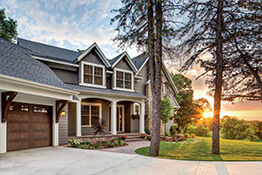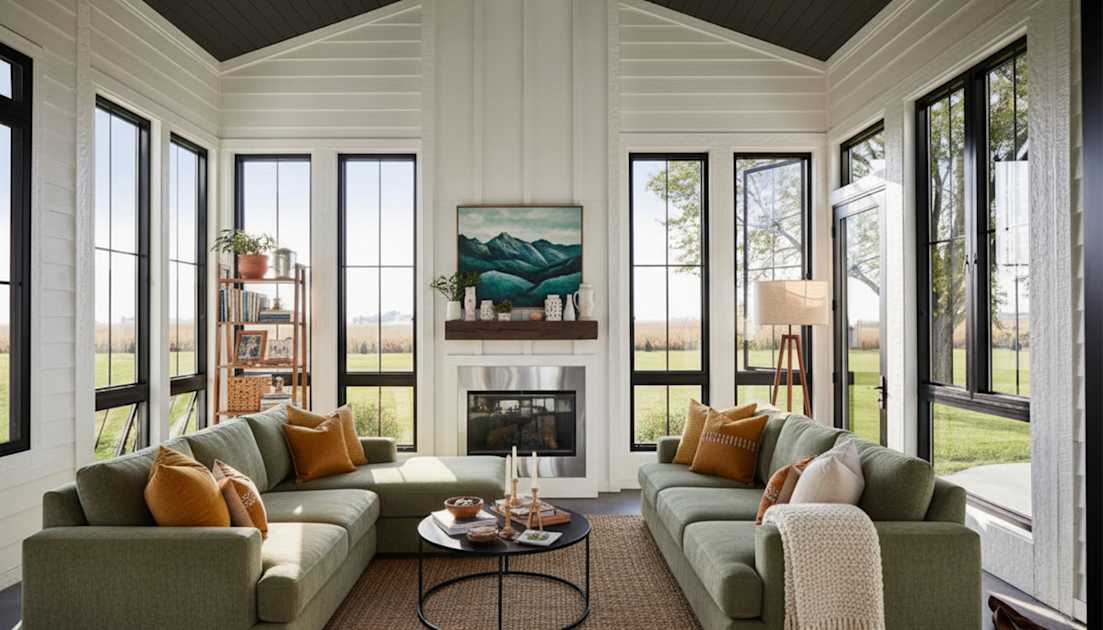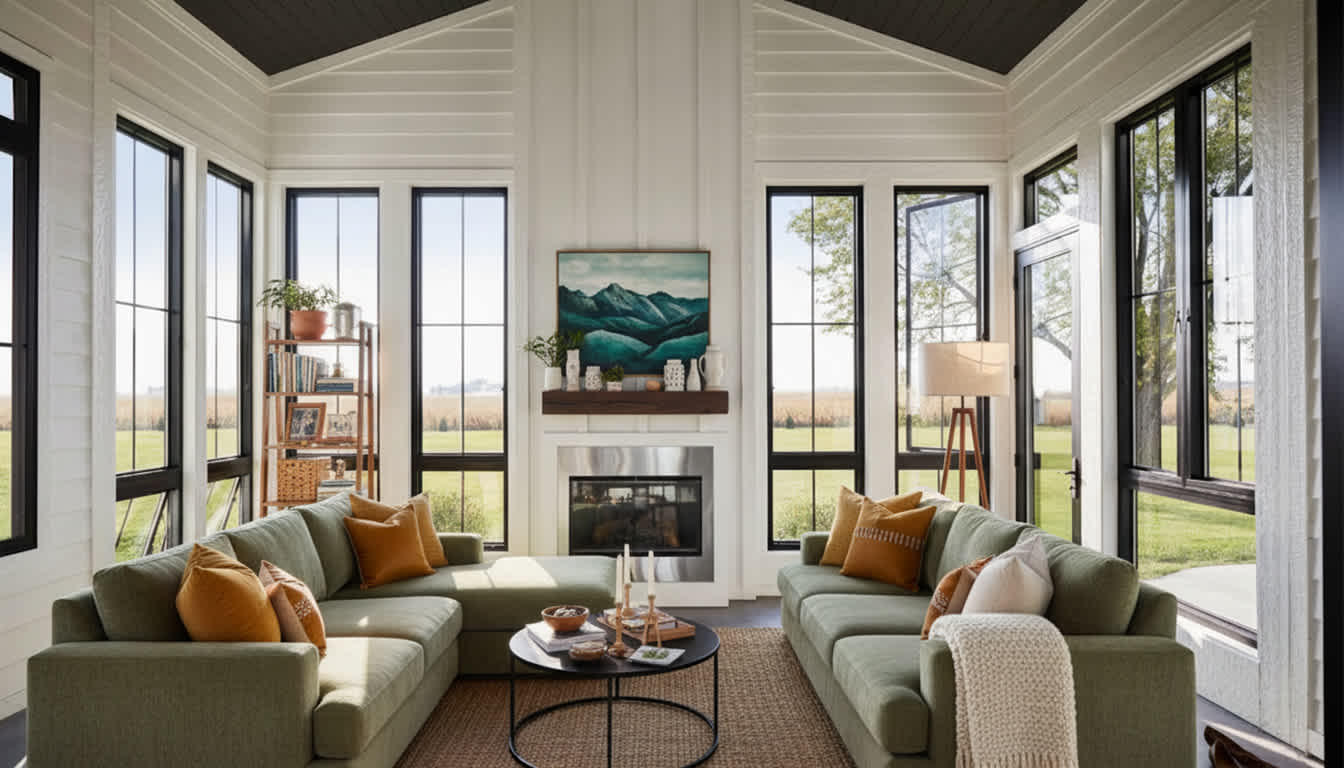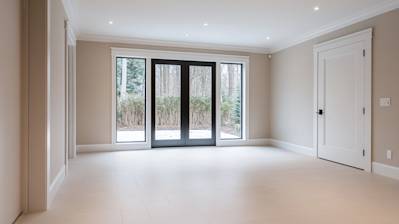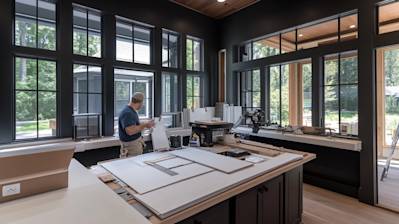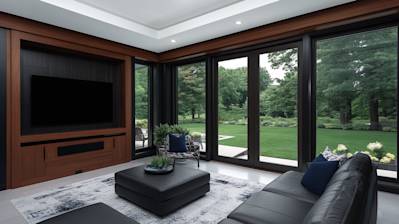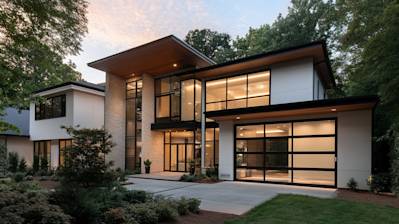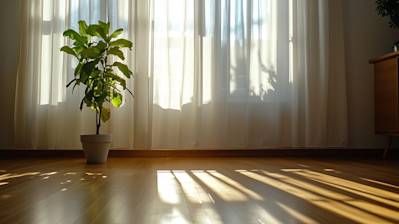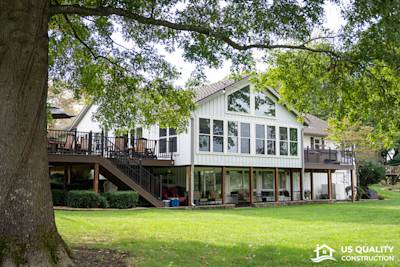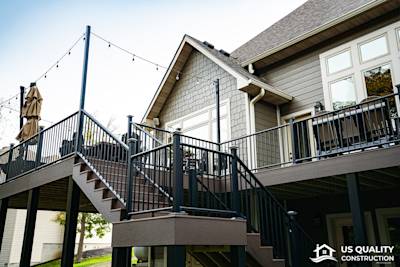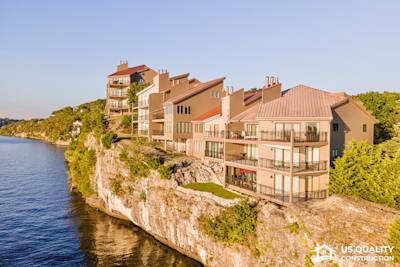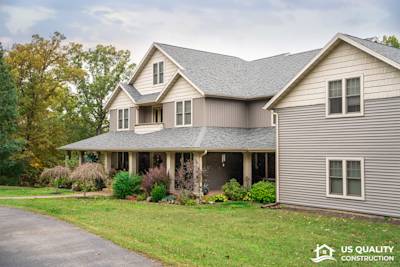Replacing windows can be a significant investment, but knowing that investment's cost is crucial to anyone seeking to enhance the look, comfort, or energy efficiency of their home. In this article, we will comprehensively cover everything you need to know about the cost to replace windows.
Factors Influencing Window Replacement Costs
Your window replacement cost will be primarily shaped by numerous factors:
- Window Type: The type of window you choose can drastically impact the price. For instance, double-hung windows are typically more affordable than bay or bow windows.
- Material: The material you choose for your window frames also influences the cost to replace windows. Option includes vinyl, wood, fiberglass, or aluminum.
- Size: Windows come in all sizes and shapes, and as you might expect, larger windows will cost more to replace than smaller ones.
- Number of Windows: The number of windows you're replacing also comes into play. If you're replacing multiple windows, you may benefit from volume discounts.
- Location: Geography can also affect window replacement costs, as the price of materials and labor will vary across different regions.
- Installation: This cost depends on the complexity of the installation process and the contractor's rates.
Calculating Average Window Replacement Costs
Let's delve deeper into specific costs associated with window types, materials, labor, and energy efficiency options.
Average Cost by Window Type
- Double-Hung Windows: These windows range from approximately $150 to $650 per window.
- Casement Windows: These will typically set you back between $200 to $800.
- Sliding Windows: Prices for these windows run the gamut from $250 to $1300.
- Bay or Bow Windows: Because of their size and structure, these windows top the price range at about $500 to $3,000 per window.
Average Cost by Material
- Vinyl Windows: This sturdy and low-maintenance option typically costs $250 to $600 per window.
- Wood Windows: Expect to budget between $600 to $1000 per window.
- Fiberglass Windows: These are latest in the window industry and can cost up to $900 per window.
- Aluminum Windows: These windows are also a costlier option, ranging from $450 to $1200 per window.
Labor Costs
Labor costs can vary depending on the nature and complexity of the installation. A straightforward replacement in a home with easy access and previous window structures may cost between $100 to $250 per window, while complex installations could run up to $400 per window.
Energy Efficiency Options and Costs
Choosing energy-efficient windows can save you money in the long run, but they also come with a higher upfront cost. Energy Star certified windows cost about 15% more on average, but they can help slash your energy bills by up to 12%.
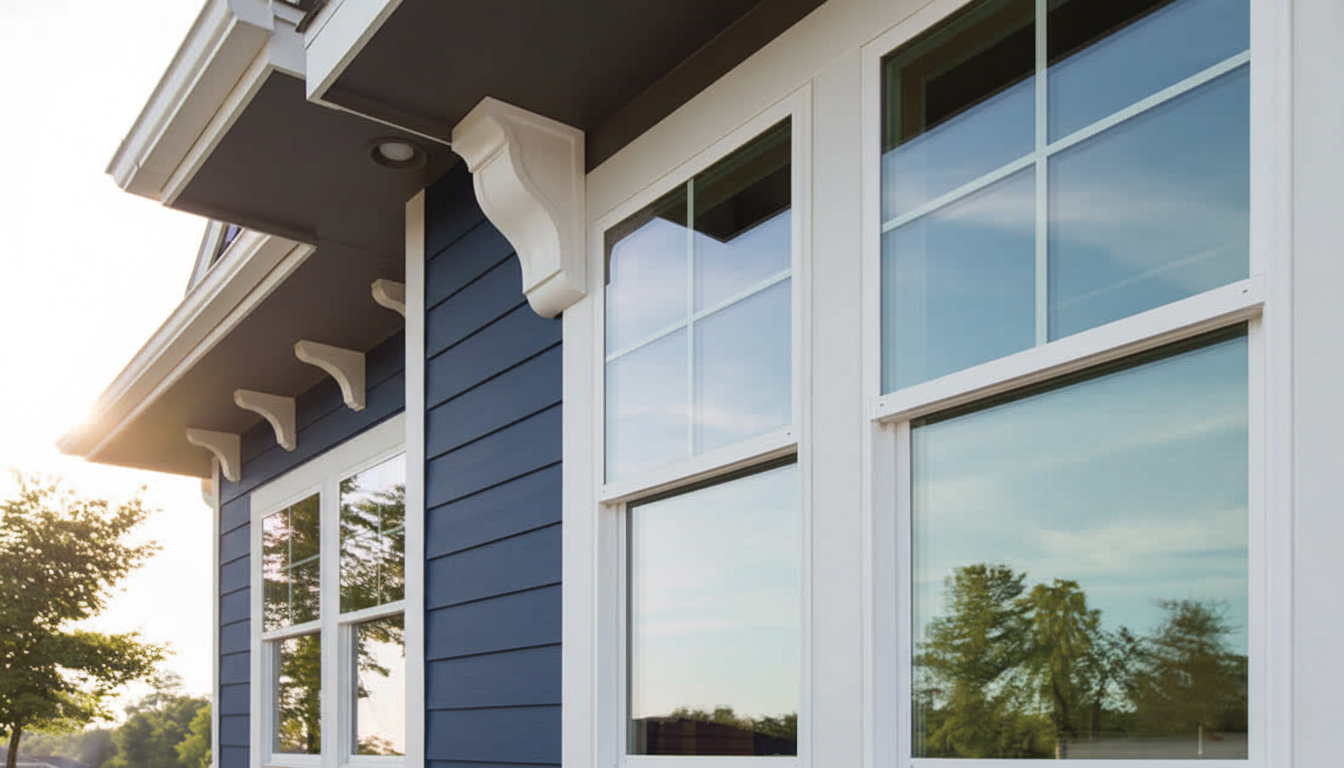
Frequently Asked Questions about Cost To Replace Windows
Are There Cheaper Alternatives to Full Window Replacement?
Yes, there are. Instead of fully replacing the window, a more economical alternative might be to repair them instead. This could be beneficial if the damage is minor. You could also consider retrofitting, which involves only replacing the glass and keeping the existing frame. Another option is to install window inserts, which are smaller windows that fit into the existing window opening. These options can cost considerably less than a full window replacement.
Does the Cost of Replacing Windows Depend on the Size?
Yes, the size of windows significantly affects the cost to replace them. Larger windows require more materials and labor to install, thus increasing the cost. Conversely, smaller windows may need less labor and resources, reducing the overall cost of window replacement.
Can the Type of Window Affect the Replacement Cost?
Absolutely. The cost to replace a window significantly varies depending on its type. For example, replacing a standard single-hung window may cost less compared to installing a more complex bay window. Similarly, energy-efficient windows, like double-pane or Low-E coated windows, cost more than their traditional counterparts because of their increased benefits and technical complexity.
Will the Material of the Window Impact the Replacement Cost?
Definitely. The material of the window plays a significant role in determining the window replacement cost. Vinyl windows are usually the most affordable types, while wood or fiberglass windows are more expensive due to their aesthetically pleasing appearance and long-term durability.
How Much Does Labor Cost in Window Replacement?
The labor cost in window replacement typically falls between $38 to $125 per hour. However, the actual labor cost can vary greatly depending on the complexity of the job, the type and size of the window, as well as your location.
Does Replacing Windows Increase Home Value?
Yes, replacing windows can increase home value. In fact, real estate experts claim that you can recoup around 70-80% of your window replacement costs in home value. Bear in mind, while newer windows can make your home more attractive to potential buyers and save on energy bills, the increase in home value can also depend on the market situation and the overall quality of the rest of your home.
How Often Should Windows Be Replaced?
Typically, well-maintained, high-quality windows could last for 15 to 20 years or more. However, multiple factors can affect the lifespan of windows, including the window material, the weather conditions they are subjected to, as well as the quality of the installation. If your windows show signs of damage such as drafts, condensation, or are hard to open and close, it might be time to replace them.
Is Window Replacement Cost Tax Deductible?
Under some circumstances, it is possible to deduct the cost of window replacement from your taxable income. If the replacement is part of a remodeling job on a home office or rental property, you can often claim them as a deduction. You can also get tax credits for energy-efficient windows, but this depends on the current tax regulations, so it's always best to consult with a tax professional.
Pros of the Cost to Replace Windows
Potential for Energy Savings
One of the positive aspects of replacing windows is the potential for energy savings. Newer windows tend to be designed with energy efficiency in mind. As a result, they can help in reducing the amount of energy needed to heat or cool the home. Consequently, although homeowners might have to spend upfront on the replacement, they might notice a significant decrease in their utility bills over time, which could eventually offset the cost of the window replacements.
Enhanced Aesthetics
Replacing old or worn-out windows with new ones can significantly improve the overall look and feel of a home. This not only provides the homeowner with a more pleasant living environment but can also potentially increase the home's curb appeal and value, which can particularly come in handy if the homeowner ever decides to sell it. Thus, the costs incurred replacing windows can be viewed as a long-term investment in the home's value.
Improved Functionality and Maintenance
New windows often function better than their older counterparts. They are easier to open, close, or lock, which improves the usability of the home. Also, the newer windows available in the market are usually designed to be low maintenance. For instance, some come with features like easy-to-clean surfaces or durable materials that resist wear and tear, hence reducing the long-term maintenance cost.
Increased Comfort and Noise Reduction
High-quality replacement windows can provide better insulation, reducing drafts and making the home's interior more comfortable year-round. Apart from thermal comfort, new windows may also come with noise reduction features. Particularly for those living in busy neighborhoods, replacing windows can help in maintaining a quieter and more peaceful home environment.
Cons of the Cost to Replace Windows
Upfront Expense
Perhaps the most glaring drawback of window replacement is the initial cost. Depending on the size, type, and quality of windows selected, the costs can quite quickly add up. The cost can also increase if the window frames need to be replaced in addition to the window itself, or if any structural changes need to be made to accommodate the new window.
Time-Consuming
The process of replacing windows can be time-consuming. Apart from choosing the right windows for your home, which in itself can be a long process, installing the windows can take several days or even weeks, depending on the number of windows to be replaced. This could be inconvenient for homeowners, especially if they have busy schedules.
Potential for Poor Installation
While new windows have the potential to offer increased energy efficiency, this could be compromised if the windows are installed improperly. Poor installation could not only negate the energy savings but also lead to other issues such as leaks or drafts. Hence, homeowners would then have to spend additional money fixing these issues.
Disruption and Mess
Replacing windows can cause a bit of disruption and mess in the home. Old windows need to be removed, new ones need to be installed, and there may be remnants of the old windows that need to be disposed of. This could lead to temporary discomfort and inconvenience in the living environment.
Risk of mismatch
There is always a risk that the new windows may not match the style of the rest of the house or even other windows if all are not being replaced. This could negatively affect the aesthetics of the house and may require additional expenditure to rectify. Choosing a complimentary or matching style is essential but can be difficult.
Decreased value in historic homes
If one owns a historic home, replacing original windows with new ones can sometimes decrease the value of the home. Historic windows are often unique and add character to the house. Replacing these with new, more generic windows could take away some of that character and the potential historic value.
Myths/Misconceptions about the Costs to Replace Windows
Whether you're building a new home or renovating an old one, window replacement is one topic that comes up often. Many homeowners are confused by the misconceptions and myths surrounding the costs of replacing windows. Let's look at some of these common misconceptions and debunk them one by one.
Myth 1: Replacing Windows is Always Extremely Expensive
Many people believe that window replacement is always a costly affair. This isn't necessarily true. The cost of window replacement largely depends on various factors like the type of window, material, brand, size, and labor costs, amongst others.
Factor 1: Type of Window
Different types of windows come with different price tickets. For instance, awning windows might cost more than double-hung windows, while picture windows could be more expensive due to their larger size.
Factor 2: Material
The material of the window frames also plays a role in determining the cost. While vinyl windows are usually the least expensive, wood and fiberglass windows cost more due to their durability and aesthetic appeal.
Myth 2: You Need to Replace All Windows at Once
It's a common misconception that all windows need to be replaced at the same time. While it’s ideal to replace all windows to maintain uniformity, it's not a hard-and-fast rule. If only a few windows are damaged, you can certainly replace them individually. The cost would vary depending on the number of windows you replace.
Myth 3: More Expensive Windows Mean More Energy Savings
While it's true that energy-efficient windows can help reduce energy costs, it doesn't mean that the pricier the windows, the more savings you'll make. The Department of Energy states that energy-efficient windows can reduce energy costs by 12%-33%, but it also emphasizes the importance of proper installation. If your window is not installed correctly, it's not going to save energy, regardless of how expensive it was.
Myth 4: DIY Window Replacement Will Save a Lot of Money
Many homeowners believe that DIY window replacement will save a significant amount of money. While it may seem tempting to cut out labor costs, improperly installed windows can lead to air leaks and energy losses, causing higher energy bills in the long run. Moreover, you may not have access to the same quality of windows that professional installers can provide. This can result in more costs in case of premature window failures.
Myth 5: Windows Should Only Be Replaced in Warm Weather
It’s a misconception that window replacement is only suitable for warmer weather. Professional installers can replace windows in virtually any weather condition, adjust their procedures, and select appropriate sealants that work effectively even when it's cold. However, note that extreme weather conditions could slow down the installation process, increasing labor costs.
Myth 6: Window Replacement Won’t Improve Home Value
Contrary to this myth, replacing windows can increase a home's value. According to the National Association of Realtors, homeowners can recover about 73% of the replacement window project cost upon home sale. This figure can vary based on factors like the quality of windows, installation, and regional markets.
Understanding all these misconceptions surrounding the cost of replacing windows allows homeowners to make an informed decision. Remember, when it comes to windows, choose quality over cost because good windows are a long-term investment, ensuring comfort, energy efficiency, and an aesthetic appeal for your home.
Summary
Upgrading your home can be a pretty strenuous task, especially when considering the cost to replace windows. It's not just about getting a new set of windows, but entails a range of expenses, from purchasing new window units to professional installation. The total cost will depend on several factors such as the type, shape and size of the windows, the materials used, and the complexity of the installation process. Doing a bit of research beforehand can help you ballpark the expenses and make sure you’re not caught off guard when the bill arrives.
Each window replacement project is unique and therefore, carries a different price tag. The cost to replace windows varies greatly based on the aforementioned factors. With a generous assortment of window types and materials on the market, homeowners can potentially find a sweet spot between quality and affordability. Keep in mind that while going for a low-cost option might save you money upfront, more energy efficient windows, though costlier, could save you money in the long run.
Despite the initial investment, replacing windows is not an expense to shy away from. Not only does it boost your home’s curb appeal and overall value, but it can also help lower your energy bills, making it a worthwhile investment. The cost to replace windows may be substantial, but the benefits certainly outweigh it. So get creative, do your research, set a realistic budget, and embark on your window replacement journey. Remember, it's not just about fitting in some glass panels, but transforming your living spaces into more pleasant, energy-efficient homes.
About US Quality Construction
At US Quality Construction of Kansas City, MO, we are not just any construction company. We've built our reputation by providing top-tier construction services to the heart of America. For us, quality is not just a part of our name, it's a promise we deliver to every client. From small remodeling projects to substantial corporate workspaces, our team of experienced professionals is dedicated to turning your vision into reality, taking care of every detail in between. Our passion reflects in our work ethic and our commitment to craftsmanship. So, if you're looking for a trustworthy partner for your next construction project, US Quality Construction is here, ready to make it happen.
Tags: windows, home improvement, renovation,
